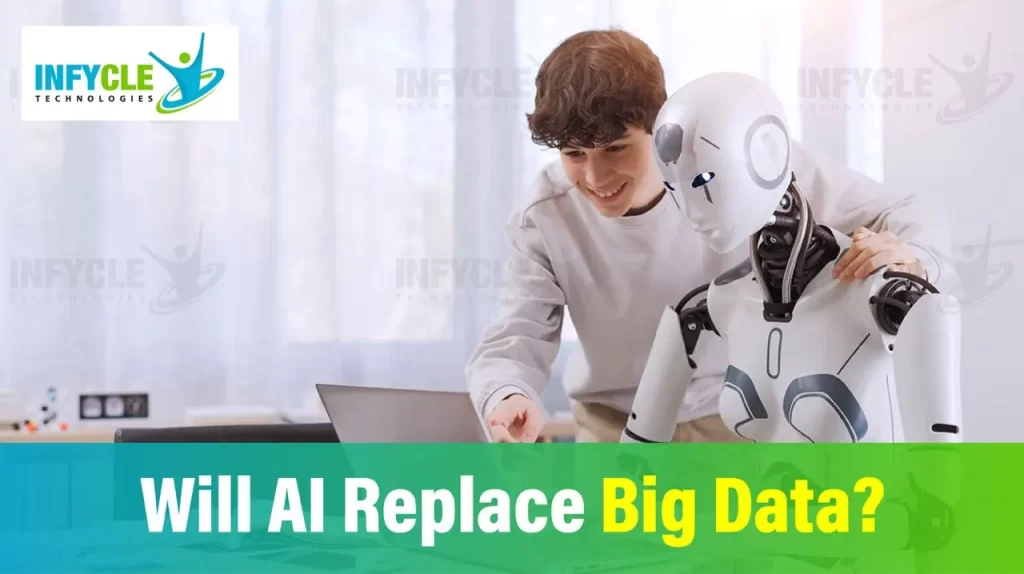Will AI Replace Big Data?
Significant advancements in Artificial Intelligence (AI) and Data Analysis have occurred in recent years. Due to the high salary, a career in data science has become increasingly attractive among young professionals. Employers constantly search for bright individuals with the necessary skill set for data science positions and responsibilities.
However, with a recent boom in the use of generative AI models such as Chat GPT, discussion of Artificial Intelligence (AI) has increased dramatically. During this time of artificial intelligence (AI) advancements, the threat of AI and ChatGPT replacing data scientists has been bothering all professionals.
Do you worry that AI will ruin your career as a data scientist? Please do not jump to any conclusions before you read this. Even if AI is transforming data science, it is unrealistic to think that AI would replace people and automate every work.
This article will examine the relationship between artificial intelligence (AI) and data analysis covering everything from comprehending the fundamentals of the technology to projecting its long-term effects., the skills of both AI and human analysts, and the possible effects of AI on the data analysis industry.
Overview Of Data Analysis And Artificial Intelligence:
This blog delves deeply into the ways that data analysis and artificial intelligence are changing. We will also explore the concepts of artificial intelligence, and data analysis, and how each of them works together in today’s technologically advanced society.
Artificial intelligence (AI) and data science collaborate closely, and their relationship has grown recently. Globally, they are altering the way economies, corporations, and communities function. Understanding data, whether or not it is organized, is the main goal of data science. It extracts meaningful information from data using a variety of techniques, including machine learning and statistics. Making decisions involves gathering, organizing, evaluating, and forecasting data.
On the other hand, AI builds computer systems that are capable of performing activities that often need human thought. These activities could involve everything from object recognition to decision-making. Artificial Intelligence can be very task-specific or more versatile and generic. Data science and AI work together to drive innovation and discover fresh approaches to challenging issues.
Read our blog about “What Is The Future Of Big Data And AI?” for more information.
Will AI Replace Data Analysts?
The use of AI in data analysis is altering the way analysts do their jobs. By automating repetitive tasks, AI can improve data processing accuracy and effectiveness.
However, will AI replace data analysts? Let’s explore the advantages and limitations of AI in data science in detail
Benefits Of AI In Data Science
Here are some of the advantages of AI in data science.
- AI to Enhance Data Analysis Procedures
Data science is developing quickly, with new technology changing traditional approaches. Artificial intelligence (AI) is now greatly enhancing predictive analytics, a crucial area of data analysis. Artificial Intelligence (AI) can analyse large datasets in a matter of seconds, some of which are far beyond human knowledge. Because of this, the work of a data analyst is now much more precise and efficient.
- AI Enhances Productivity
By leveraging AI, predictive analytics platforms allow data analysts to avoid repetitive tasks. Machine learning algorithms automate challenging data processing operations, allowing data analysts to work on more valuable tasks like strategic decision-making and process improvement. 75% of Indians employ AI tools to increase productivity.
The amount of time needed for data processing is significantly decreased with AI automation. Today, predictive models can be created in a matter of hours or minutes instead of weeks. As a result, data analysts are more productive.
- Quality of AI-generated insights
The quality of insights produced by predictive modeling has increased because of AI. Artificial intelligence (AI) may uncover patterns and trends that human analysis might miss by utilizing machine learning techniques. This allows AI to give data analysts more comprehensive insights.
By producing new data points, generative AI is also contributing intriguingly to data analytics by expanding comprehension of already-existing data and offering more perspectives. Predictive modeling is made easier by the created data points, which depend on the original data input into the AI.
Thus, rather than seeing AI as a threat, data anlysts must consider it as a tool to improve their skills.
Difficulties Of AI In Data Science
Even the most sophisticated AI is still severely constrained when dealing with more advanced-level data science tasks:
- Absence of Reasoning: Artificial intelligence (AI) is capable of producing text and identifying patterns in data, but it lacks the real comprehension and reasoning skills necessary for making decisions.
- Subject to Errors and Bias: In the absence of human supervision, artificial intelligence (AI) is at risk of repeating past biases seen in datasets and generating wrong inferences because of hallucinations, or other general accuracy problems.
- Lack of Strategic Oversight: AI is unable to take a step back and decide how best to approach high-value issues or follow data science best practices. For complicated decision-making, it lacks human judgement and reasoning.
Therefore, while AI can support and improve many data science tasks, it is unable to make the important decisions and evaluations that are necessary for maximizing profit from data without human intervention.
The Unique Value Of Human Data Scientists
Even though AI is streamlining more data science jobs, human data scientists continue to offer a special value that AI is unable to match now:
- Domain Expertise: Due to their sector, data scientists frequently possess extensive domain knowledge, which enables them to contextualize data insights more effectively. An AI doesn’t have this prior knowledge. To increase your domain knowledge, you can attend a data science training in Chennai.
- Critical Thinking: Critical thinking is the ability to reason, strategically supervise, and make decisions that are essential for insightful analysis by human data analysts. Complex decision-making is not something AI can do.
- Communication: To help users make informed business decisions, data scientists analyze data and provide data insights. AI is not socially skilled enough to communicate effectively.
- Ethics: Humans are capable of seeing potential errors in data and analyzing it by conducting ethical data analysis. Without supervision, artificial intelligence may propagate biases.
- Innovation: Data scientists provide innovative approaches for generating unique insights from data in areas where AI has limits. Their innovative thinking advances the industry and may assist in steering AI functions.
In short, people have strategic skills, interpersonal skills, values, and analytical reasoning, all of which AI currently lacks.
Conclusion
So to answer the question, will AI replace data scientists? While AI can automate basic data operations, it is unable to replace human abilities such as critical thinking, which are crucial for optimizing data value. AI should be managed by data scientists, who may use it to increase productivity and concentrate more on highly valuable strategic tasks. Data science professionals soon will be able to extract even more insights from increasingly complicated data by collaborating with AI and humans. AI therefore enhances rather than replaces the crucial human role of the data scientist, even though it will change some aspects of the profession. Enroll at Infycle Technologies to have a better understanding about both data science and artificial intelligence.





